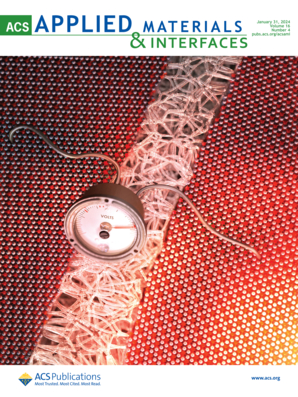免疫检查点抑制剂相关心肌炎患者的自身抗体分析:一项试点研究
IF 8.3
2区 材料科学
Q1 MATERIALS SCIENCE, MULTIDISCIPLINARY
引用次数: 0
摘要
背景免疫检查点抑制剂(ICI)相关心肌炎是一种罕见但可能致命的免疫相关不良事件。因此,确定生物标志物对于选择和管理接受ICI治疗的患者至关重要。ICI心肌炎患者的血清自身抗体(AAbs)可作为预测、诊断和预后ICI心肌炎的潜在生物标志物。我们利用含有约 17,000 个独特全长人类蛋白质的人类蛋白质组芯片进行了一项试验性研究,以调查与 ICI 心肌炎相关的 AAbs。方法和结果利用 ICI 治疗开始前和心肌炎发病后立即收集的三名 ICI 心肌炎患者的血清进行了 AAb 分析。所有患者均接受了抗程序性死亡-1 抗体单药治疗。基线时,病例 1、病例 2 和病例 3 的血清样本中分别有 116、296 和 154 种自身抗原与免疫球蛋白 G(IgG)呈阳性反应。在这些蛋白中,免疫球蛋白 kappa J 区重组信号结合蛋白(RBPJ)被所有三个样本识别,32 种自身抗原被三个样本中的任意两种识别。在 ICI 心肌炎发病时,与基线相比,病例 1、病例 2 和病例 3 的血清样本中分别有 48、114 和 5 种自身抗原与 IgG 的反应更强。其中,针对真核翻译起始因子 4E 结合蛋白 3(EIF4EBP3)的抗体上调幅度最大,增加了 38 倍。基因本体(GO)和京都基因组百科全书(KEGG)富集分析显示,B细胞受体信号转导、白细胞跨内皮细胞迁移和胸腺发育是受影响最大的通路。使用 DisGeNET 进行的富集分析表明,在 ICI 心肌炎患者体内检测到的 AAb 反应蛋白与多种疾病有关,包括扩张型心肌病和肌无力。然而,我们的研究结果还需要在涉及更多患者的临床试验中进一步独立验证。本文章由计算机程序翻译,如有差异,请以英文原文为准。
Autoantibody profiling of patients with immune checkpoint inhibitor-associated myocarditis: a pilot study
BackgroundImmune checkpoint inhibitor (ICI)-associated myocarditis is a rare, but potentially fatal, immune-related adverse event. Hence, identifying biomarkers is critical for selecting and managing patients receiving ICI treatment. Serum autoantibodies (AAbs) in patients with ICI myocarditis may serve as potential biomarkers for predicting, diagnosing, and prognosing ICI myocarditis. We conducted a pilot study using a human proteome microarray with approximately 17,000 unique full-length human proteins to investigate AAbs associated with ICI myocarditis.Methods and resultsAAb profiling was performed using sera collected from three patients with ICI myocarditis before the start of ICI treatment and immediately after myocarditis onset. All patients received anti-programmed death-1 antibody monotherapy. At baseline, 116, 296, and 154 autoantigens reacted positively to immunoglobulin G (IgG) in the serum samples from Cases 1, 2, and 3, respectively. Among these proteins, the recombination signal-binding protein for the immunoglobulin kappa J region (RBPJ) was recognized by all three samples, and 32 autoantigens were recognized by any two of the three samples. At the onset of ICI myocarditis, compared to baseline, 48, 114, and 5 autoantigens reacted more strongly with IgG in the serum samples from Cases 1, 2, and 3, respectively. Among these, antibodies against eukaryotic translation initiation factor 4E binding protein 3 (EIF4EBP3) were the most upregulated, with a 38-fold increase. Gene ontology (GO) and Kyoto Encyclopedia of Genes and Genomes (KEGG) enrichment analyses highlighted that B-cell receptor signaling, leukocyte transendothelial migration, and thymus development were among the most affected pathways. Enrichment analyses using DisGeNET revealed that proteins reacting to AAbs detected in patients with ICI myocarditis are associated with several diseases, including dilated cardiomyopathy and muscle weakness.ConclusionsThis pilot study provides the first integrated analysis of serum AAb profiling in patients with ICI myocarditis and identifies novel candidate markers associated with an increased risk of developing ICI myocarditis and its pathogenesis. However, our results require further independent validation in clinical trials involving a larger number of patients.
求助全文
通过发布文献求助,成功后即可免费获取论文全文。
去求助
来源期刊

ACS Applied Materials & Interfaces
工程技术-材料科学:综合
CiteScore
16.00
自引率
6.30%
发文量
4978
审稿时长
1.8 months
期刊介绍:
ACS Applied Materials & Interfaces is a leading interdisciplinary journal that brings together chemists, engineers, physicists, and biologists to explore the development and utilization of newly-discovered materials and interfacial processes for specific applications. Our journal has experienced remarkable growth since its establishment in 2009, both in terms of the number of articles published and the impact of the research showcased. We are proud to foster a truly global community, with the majority of published articles originating from outside the United States, reflecting the rapid growth of applied research worldwide.
 求助内容:
求助内容: 应助结果提醒方式:
应助结果提醒方式:


